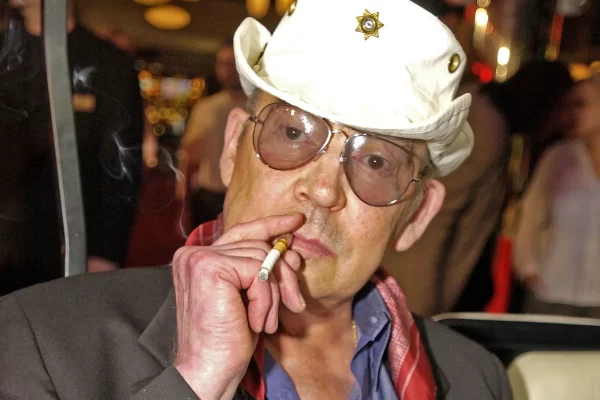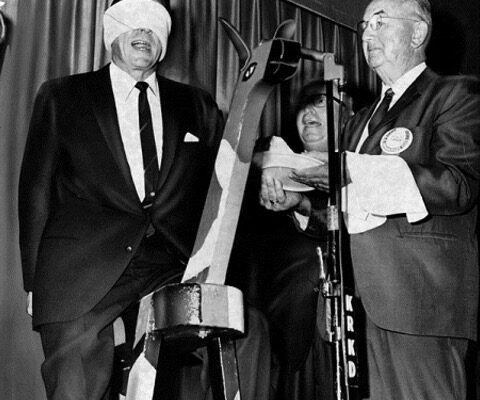The industry, which once celebrated the seasoned cynicism of reporters like me, had decided we were no longer the princes of the profession but rather its dinosaurs. Our extinction was imminent.
It was one of those nights when you start to wonder if your reflection in the mirror is a window into the past, or worse—into the future. The Emmys. Bright lights, sharper suits, and faces that somehow look ageless under layers of makeup.
And there I was, standing on the red carpet, a relic of an era when some journalists wore actual hats and carried notepads instead of smartphones. Dolce and Gabbana, mind you—navy pinstripe, no less—but still, a suit that looked like it had seen more smoky newsrooms than red carpets.

As Selena Gomez passed by—her eyes sparkling like someone who knows a secret or two about this world—there was a moment. Not just any moment, mind you, but one of those moments you read about in the works of Gabriel Garcia Marquez, where time slows down and something otherworldly shimmers in the air. Her gaze met mine—just for a second—and I swear there was recognition there, as if she mistook me for someone she once knew. Or maybe she thought I was her father’s business associate, but hey, a man can dream.
Then it happened: a wave. A little wave. One of those elegant, almost flirtatious gestures that says, “Let’s catch up inside,” knowing full well that she and I were destined to occupy very different sections of the venue.
Of course, I only had access to the red carpet, and she would soon be whisked away into the world of actual stars. But in that moment, I might as well have been a Rockefeller, or at least someone with an expense account large enough to cover dinner for two at the Four Seasons.
Just as I was about to return to reality, someone from Selena’s entourage leaned in and whispered, “Are you with Annabel?”
My brain scrambled. Annabel? The name floated in my head like an old Sinatra tune, familiar yet elusive. Was that her agent at WME? In my younger years, I would have lied without hesitation, claimed I was indeed Annabel’s second cousin thrice removed, and parlayed the encounter into an exclusive interview. But wisdom—or was it fatigue?—had gotten the better of me. “No,” I mumbled, shaking my head like a man who had just declined a dance with destiny.
The young reporter next to me, sporting an ensemble more H&M than haute couture, glanced over and said, “You look like a suit.” It dawned on me then, standing on that carpet, that I did indeed look like a suit—not just a suit, but an old suit. The kind of suit that smells faintly of ink, leather chairs, and missed opportunities. I mean, sure, it was Dolce & Gabbana, but let’s be honest—I looked like an agency guy. Just not with their paycheck.
And here’s where the Marquezian part kicks in. It wasn’t just the Emmys, it wasn’t just Selena Gomez, it was the realization that the world—the very one I had reported on for decades—was now a young person’s game.
And I don’t just mean acting or sports; reporting itself had been handed off to fresh-faced, Instagram-friendly twenty-somethings who still believed that journalism was a noble profession. Bless their hearts. Somewhere, Hunter S. Thompson was cackling in the great newsroom in the sky.
Last year, 2,700 reporting positions were lost in the business, and I’d bet my last glass of scotch that most of those jobs didn’t belong to kids under 40. The industry, which once celebrated the seasoned cynicism of reporters like me, had decided we were no longer the princes of the profession but rather its dinosaurs. Our extinction was imminent.
And so there I stood on that red carpet, a metaphor for my own profession. It wasn’t so much about the Emmys anymore, or even Selena, bless her heart. It was about time. About how it passes in the most bizarre, absurd, and often cruel ways. I couldn’t help but wonder if Selena had ever been interviewed by someone my age—someone who understood what she’s gone through, who had lived enough life to know that no amount of fame or success protects you from the kind of battles she’s faced. She’s been open about her struggles with mental health, a topic that was once taboo in Hollywood but is now mainstream fodder, thanks to brave souls like her.
And here’s the kicker: it’s reporters my age who should be the most understanding of Selena’s journey. We’ve seen it all—fame, fortune, heartbreak, and the inevitable human condition that creeps in no matter how high you climb.
Yet, it’s the fresh-out-of-college crowd with their TikTok channels and Twitter followings who are tasked with chronicling the lives of people like her. They’ll ask her about the dress, the shoes, maybe even her skincare routine. But do they really understand?
Standing there in my pinstripe suit, I felt like a relic, a throwback to a time when reporters didn’t just write stories—we lived them. And yet, there’s something strangely beautiful in the absurdity of it all. Like Thompson said, journalism is a cheap catch-all for fuckoffs and misfits. It’s the dirty little corner of the world where we get to peek behind the curtain, even if the curtain now belongs to someone half our age.
Selena’s memoir, My Mind & Me, is a testament to her resilience, her humanity. She’s seen the best and worst of fame, and somehow, she keeps moving forward. Maybe that’s why she recognized me on the red carpet—no, not because we’d met before, but because, deep down, she saw a kindred spirit. Someone who knows what it’s like to be chewed up and spit out by the world, yet still keeps showing up, still keeps waving, even when you know you’re not getting inside.
As I moved on to interview the next person—someone whose name I’ve already forgotten—I couldn’t help but smile.
The world may belong to the young, but at least I had my suit. And maybe, just maybe, the next time I run into Selena Gomez, I’ll be smart enough to say I’m with Annabel.
TONY CASTRO, the former award-winning Los Angeles columnist and author, is a writer-at-large and the national political writer for LAMonthly. org. He can be reached at tony@tonycastro.com.





